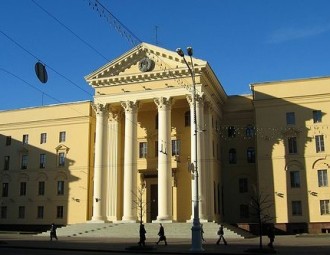Amid fading influence of large business backed by President, security forces enhanced their position

The state decided to redistribute scarce resources and strip businesses of profits nesting on public resources. As economy worsens, competition for resources may increase just as the KGB’s influence.
Last week, at a briefing, KGB Chairman Valery Vakulchyk said that further criminal inquiries and arrests were to come.
Amid several devaluations, economic recession and languishing public resources, business environment in Belarus has deteriorated, which has bolstered withdrawal of capital from the country. In all likelihood, redistribution of increasingly scarce resources may affect the president’s inner circle. And security forces are likely to play a major role in such a redistribution.
Security forces have somewhat lost their influence as Belarus engaged in normalization of relations with the EU. According to some analysts, the MFA’s weight has been growing consistently. Despite occasional tough actions against journalists, a more systematic attempt to disrupt the Belarusian-European relations could end in dismissals in the law enforcement leadership.
Nevertheless, the law enforcement is beginning to recover its lost positions. Instead of fighting against the possible "colour revolution" and persecuting the opposition, the security forces have focused on tracing financial flows and engaged in the redistribution of public resources.
Some analysts believe, that detention of businessman Yuri Chyzh was the KGB’s independent initiative. According to them, head of ‘Triple’ holding Yuri Chyzh was not a member of the inner circle, requiring the security forces to obtain the president’s consent for prosecution, which is unlikely.
Most likely, the KGB head provided President Lukashenka with evidence that Yuri Chyzh had attempted to transfer his assets abroad and had a plan to move his businesses to a more favourable environment in Lithuania or Poland. KGB Chairman Vakulchyk revealed some details about the detention of the disgraced businessman, who was attempting to escape from the country at 220 km per hour, which, incidentally, could be a figurative statement, "an ‘Interception’ plan was applied. He was driving firstly to the west towards the Lithuanian border, then towards the Brest highway”.
That said, last year’s detention of Yuri Chyzh’s close business partner, Yaprintsev, who was well aware of all ‘Triple’ affairs, could have indeed been a signal to Chyzh to accelerate withdrawal of his capital.
Recently, the Belarusian security forces have held several arrests of large businessman and more are likely to come. In addition, status and belonging to the highest echelons of power are no longer guarantees against prosecution in Belarus.
In October 2015, the third member of the Council of the Republic, the owner of Biokom company, Andrei Pavlovsky, was stripped of parliamentary immunity. However, within a month, he was released and recently pardoned by President Lukashenka after repaying USD 20 million to the state. In addition, media reported about the detention of yet another major businessman, the owner of Servolux group of companies, Evgeny Baskin.
Apparently, the law enforcement agencies have received the green light to reshuffle all large and medium-sized businesses, which nests on public resources. The security agents are likely to have sufficient information to strip most businesses of ‘excessive’ revenues.
-
03.01
-
07.10
-
22.09
-
17.08
-
12.08
-
30.09








































